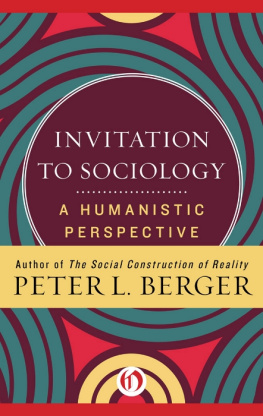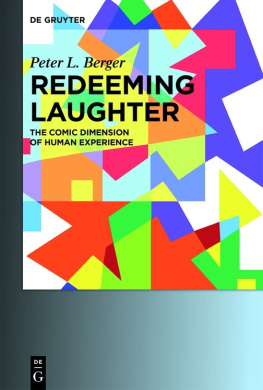
INVITATION TO SOCIOLOGY
A Humanistic Perspective
Peter L. Berger

PREFACE
THIS BOOK IS INTENDED to be read, not studied. It is not a textbook or an attempt at theoretical system-building. It is an invitation to an intellectual world that I consider to be profoundly exciting and significant. In issuing such an invitation it is necessary to delineate the world to which the reader is being invited, but it will be clear that the latter will have to go beyond this book if he decides to take the invitation seriously.
In other words, the book is addressed to those who, for one reason or another, have come to wonder or to ask questions about sociology. Among these, I have supposed, will be students who may be toying with the idea of taking up sociology in a serious way, as well as more mature members of that somewhat mythological entity called the educated public. I have also supposed that some sociologists may be attracted to the book, although it will tell them few things that they dont know already, since all of us derive a certain narcissistic satisfaction in looking at a picture that includes ourselves. Since the book is addressed to a fairly wide audience, I have avoided as much as possible the technical dialect for which sociologists have earned a dubious notoriety. At the same time, I have avoided talking down to the readermainly because I regard this as a repulsive stance in itself, but also because I dont particularly want to invite to this game people, including students, whom one feels constrained to talk down to. I shall admit frankly that, among the academic diversions available today, I consider sociology as a sort of royal gameone doesnt invite to a chess tournament those who are incapable of playing dominos.
It is inevitable that such an undertaking will reveal the writers prejudices concerning his own field. This too must be admitted frankly from the beginning. If other sociologists should read this book, especially in America, some will unavoidably be irritated by its orientation, disapprove of some of its lines of argument and feel that things considered by them to be important have been left out. All I can say is that I have tried to be faithful to a central tradition that goes back to the classics in the field and that I believe strongly in the continuing validity of this tradition.
My special prepossession in the field has been the sociology of religion. This will perhaps be evident from the illustrations that I use because they come most readily to my mind. Beyond that, however, I have tried to avoid an emphasis on my own specialty. I have wanted to invite the reader to a rather large country, not to the particular hamlet in which I happen to live.
In writing this book I was faced with the choice of inserting thousands of footnotes or none at all. I decided on the latter course, feeling that little would be gained by giving the book the appearance of a Teutonic treatise. In the text, names are given where ideas are not part of the broad consensus in the field. These names are taken up again in the bibliographical comments at the end of the book, where the reader will also find some suggestions concerning further readings.
In all my thinking on my chosen field I owe an immense debt of gratitude to my teacher Carl Mayer. If he should read this book, I suspect that there will be passages that will make him raise an eyebrow. I still hope that he would not regard the conception of sociology here presented as too much of a travesty on the one he has been conveying to his students. In one of the subsequent chapters I take the position that all world views are the result of conspiracies. The same can be said of views concerning a scholarly discipline. In conclusion, then, I would like to thank three individuals who have been fellow-conspirators through many conversations and argumentsBrigitte Berger, Hansfried Kellner and Thomas Luckmann. They will find the results of these occasions in more than one place in the following pages.
P.L.B.
Hartford, Connecticut
1. SOCIOLOGY AS AN INDIVIDUAL PASTIME
THERE ARE VERY FEW jokes about sociologists. This is frustrating for the sociologists, especially if they compare themselves with their more favored second cousins, the psychologists, who have pretty much taken over that sector of American humor that used to be occupied by clergymen. A psychologist, introduced as such at a party, at once finds himself the object of considerable attention and uncomfortable mirth. A sociologist in the same circumstance is likely to meet with no more of a reaction than if he had been announced as an insurance salesman. He will have to win his attention the hard way, just like everyone else. This is annoying and unfair, but it may also be instructive. The dearth of jokes about sociologists indicates, of course, that they are not as much part of the popular imagination as psychologists have become. But it probably also indicates that there is a certain ambiguity in the images that people do have of them. It may thus be a good starting point for our considerations to take a closer look at some of these images.
If one asks undergraduate students why they are taking sociology as a major, one often gets the reply, because I like to work with people. If one then goes on to ask such students about their occupational future, as they envisage it, one often hears that they intend to go into social work. Of this more in a moment. Other answers are more vague and general, but all indicate that the student in question would rather deal with people than with things. Occupations mentioned in this connection include personnel work, human relations in industry, public relations, advertising, community planning or religious work of the unordained variety. The common assumption is that in all these lines of endeavor one might do something for people, help people, do work that is useful for the community. The image of the sociologist involved here could be described as a secularized version of the liberal Protestant ministry, with the YMCA secretary perhaps furnishing the connecting link between sacred and profane benevolence. Sociology is seen as an up-to-date variation on the classic American theme of uplift. The sociologist is understood as one professionally concerned with edifying activities on behalf of individuals and of the community at large.
One of these days a great American novel will have to be written on the savage disappointment this sort of motivation is bound to suffer in most of the occupations just mentioned. There is moving pathos in the fate of these likers of people who go into personnel work and come up for the first time against the human realities of a strike that they must fight on one side of the savagely drawn battle lines, or who go into public relations and discover just what it is that they are expected to put over in what experts in the field have called the engineering of consent, or who go into community agencies to begin a brutal education in the politics of real estate speculation. But our concern here is not with the despoiling of innocence. It is rather with a particular image of the sociologist, an image that is inaccurate and misleading.
It is, of course, true that some Boy Scout types have become sociologists. It is also true that a benevolent interest in people could be the biographical starting point for sociological studies. But it is important to point out that a malevolent and misanthropic outlook could serve just as well. Sociological insights are valuable to anyone concerned with action in society. But this action need not be particularly humanitarian. Some American sociologists today are employed by governmental agencies seeking to plan more livable communities for the nation. Other American sociologists are employed by governmental agencies concerned with wiping communities of hostile nations off the map, if and when the necessity should arise. Whatever the moral implications of these respective activities may be, there is no reason why interesting sociological studies could not be carried on in both. Similarly, criminology, as a special field within sociology, has uncovered valuable information about processes of crime in modern society. This information is equally valuable for those seeking to fight crime as it would be for those interested in promoting it. The fact that more criminologists have been employed by the police than by gangsters can be ascribed to the ethical bias of the criminologists themselves, the public relations of the police and perhaps the lack of scientific sophistication of the gangsters. It has nothing to do with the character of the information itself. In sum, working with people can mean getting them out of slums or getting them into jail, selling them propaganda or robbing them of their money (be it legally or illegally), making them produce better automobiles or making them better bomber pilots. As an image of the sociologist, then, the phrase leaves something to be desired, even though it may serve to describe at least the initial impulse as a result of which some people turn to the study of sociology.
Next page

















